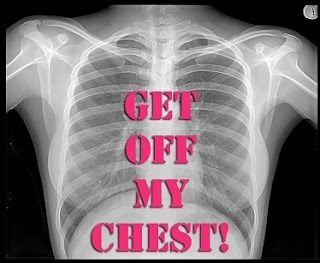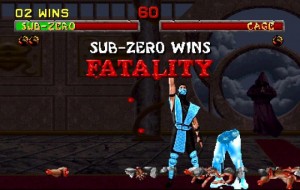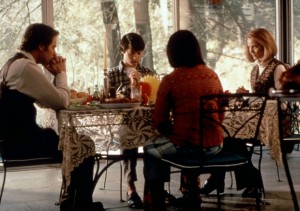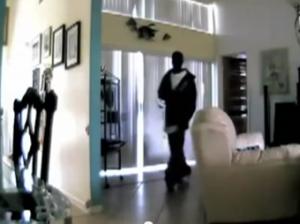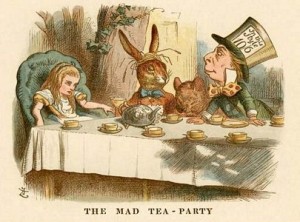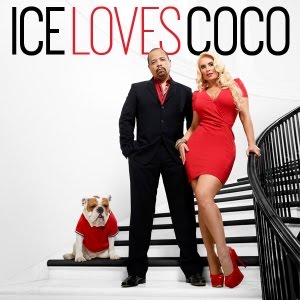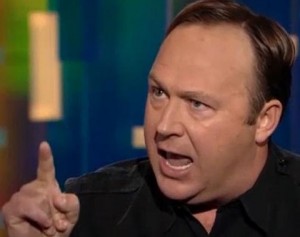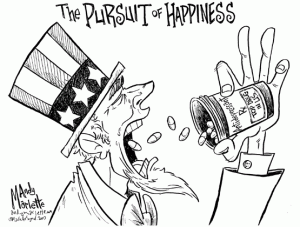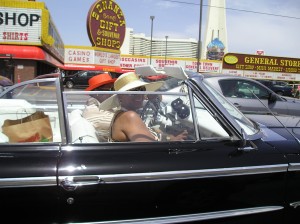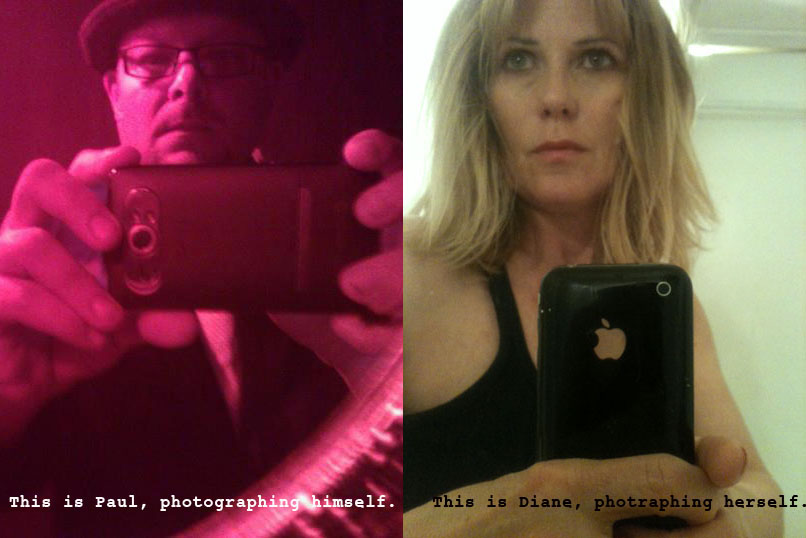Get Off My Chest! Episode 5 – Vacillating Into Summer
Enough has changed in the ongoing internet adventures of Paul and Diane that now we need a completely new intro. Up until November 2012, Paul Pearson and Diane Karagienakos had been longtime internet friends who had never actually met each other. As Paul was crossing through San Francisco last year, he, Diane and her dog Picard finally had a dinner in person, managing to keep the invasive paparazzi at bay. Since then, Diane’s moved to the Los Angeles area, Paul’s still in Seattle (for the moment), and they both still own computers. So they’re restarting their acclaimed internet conversation series Get Off My Chest! with a long treatise about summer. It was supposed to be a good-time, Beach Boys pre-Pet Sounds, sumptuous celebration of the season, which it still is, but with a couple of meaningful, reflective and bittersweet reflections middle-aged people like Diane and Paul are prone to having from time to time. Also, you Spotify users will dig the themed playlist at the bottom of this article. Enjoy.
Paul: ‘Aight. We have a topic? I forgot the topic.
Diane: SUMMER, Paul. The topic is summer. Sheesh!
Paul: Summer. Ah, that’s right. I forgot about summer because I’m up here in Seattle, it’s June 19, and it’s freaking overcast with a very light drizzle. Summer.
Diane: (announcing what music she’s playing) Starting with the Spinners’ “One Of a Kind,” summer 1973. Annual roadtrip with our visiting grandmother. This time to Oceanside, CA! My brothers fished.
Paul: Ahhh, the Spinners. One of my all time favorites. So, how are you enjoying the summer in L.A., which I understand has been going on since February?
Diane: I got here the first day of May, and I have to say — it feels like a childhood summer! As you know I’ve been in San Francisco most of 23 years. Which rates right up there with Seattle in terms of summer hotspots. So in preparation — which I’m glad one of us did! — I made a list of all the things summer meant to me: as a kid, adolescent, etc. Do you have any off the top of your head?
Paul: Summers in Sacramento are often unforgivably hot. Both of the houses my family lived in Sacto had swimming pools. Including this freaky Grecian-style swimming pool with a dark-blue bottom, so it retained heat. I made a lot of tents in the backyard, too.
Diane: New track: “No More Mr. Nice Guy,” Alice Cooper, summer 1973. I’m realizing I’ve got many songs from that summer. I think it was the year, I was 9, when I realized there was an adult world other than that of my parents. AM radio was a portal to this other world that excited me so.
Paul: AM radio! You know, I’ve been working on the second chapter of “My Life In Music,” and it’s all about Top 40 AM radio of the ’70s. It was much maligned, but I have very, very fond memories of KFRC in San Francisco, and KNDE in Sacto. That era of pop radio was truly desegregated. If a country song was the most popular in the nation, Top 40 radio played it. If an R&B song was #1, they’d play that too. So yeah, a big memory of my summers is walking down the street where I lived in Vacaville, CA and hearing all these radios.
Diane: You’re right! Mac Davis, Charlie Rich, Olivia Newton-John were all country, and they became top 40 stars, as did Al Green & a whole slew of R&B stars.
So my list: Summer has meant — at various ages growing up — freedom, transition, optimism, adventure, discovery, and Jerry Fucking Lewis. I grew up in Vegas, and that guy and that telethon herealded the end of all of the above, and the return to conformity, authority, alarm clocks, homework deadlines, and the preempted broadcast of Wonderful World of Disney and Mutual of Omaha’s Wild Kingdom on that Sunday night. All to watch that screaming crazed sweaty creepy man demand you send more money to his kids, fuck kids with any other disease. He was the face of the end summer.
Sorry, I clearly still have Jerry Lewis issues.
Paul: You know I played on a Jerry Lewis telethon once? Not the actual, Jerry Lewis telethon, with him, but I played at the local station that was broadcasting it. They cut away every hour to the local channel, and I played on that segment.
As a Jehovah’s Witness kid, summer also meant going door-to-door all damn summer long, and heading to Reno for district conventions. It was also when I introduced myself to Johnny Carson and David Letterman, ’cause I got to stay up late.
Diane: Yup, Johnny Carson, summer 1974. Also the summer my mother — god bless her — took me & my brothers to see Blazing Saddles at the drive-In. I brought my Panasonic tape recorder. I still have every word of that movie memorized.
Paul: Blazing Saddles. Yes. That was a very important film.
Diane: Summers have become just another season. I wonder if you, being a parent are able to appreciate summer (in its most fabled definition) by proxy through your children. Do you have a big Slip-n-Slide in the back yard?
Paul: We have a deck, not an actual backyard, but yes, it’s full of summer toys and aquatic-based apparatuses. And a big-ass gas grill. That’s when I truly get down with the summer thing, when I’m grilling something. It’s that moment I feel I have mastered my masculinity, when I am standing over a rack of ribs, divining smoke with my spatula. Then I have a Sex And The City marathon. As for living vicariously through my kids – yeah, sorta, I suppose. But I do that all year long, really.
Diane: Man is to barbecue what Cro-Magnon was to Wooly Mammoth. That’s what I always say. What really stands out, regarding childhood summer, for me are those above-mentioned road trips: five of us in a car for two or three weeks. No one had smart phones to drown out the present company. We fought. We made up games in the car (often utilizing the cassette recorder), we sang (at least I did, to the AM radio). I can remember what I saw out a window when listening to Helen Reddy’s “You and Me Against The World” and the Stylistics’ “You Make Me Feel Brand New” — I don’t remember where exactly I was, but I remember the weather, and the scenery, of those moments. And who I was with. I’m so glad I didn’t have a smartphone as a kid. I fear all my memories would be of texting!
Paul: The summer of 1983 was probably the most important summer of my childhood. It was the first summer after I’d quit the JW’s. I got a job as rehearsal pianist for a high school summer stock theater group in Sacramento, Musical Comedy Workshop. To my utter shock I also landed the lead in Oklahoma! That summer I made a whole bunch of new friends. They were arty. They listened to old David Bowie! And they accepted me, for some reason. If I hadn’t had them during the transition, I’m not sure what would have happened to me.
Diane: I love that you had that experience. I had a similar “finding my tribe” time when I arrived at the campus of SUNY Stony Brook in 1981.
As I got older, summer became this big transitory time: 6th grade center (back in the days of integration) to junior high (I believe we now call it middle school), junior high to senior high. And with that came pubescent curiosity: about booze and drugs and sex and of course, rock and roll!
I came up with a timetable. My first experience with each of these happened during a summer. Coincidence? I think not!
Rock and roll: First concert, Frampton, 1977
Alcohol: first beer, Lowenbrau, 1978
Drugs: first joint, 1979
Sex: First time, 1980
You’d almost think I planned it.
Paul: My first rock and roll concert was in the summer of ’82, I believe. The Police and Santana. As for alcohol and sex I think I took care of all those in ’84. Probably drugs too. I was coping with my Orwellian fears.
Diane: The Police! wish I’d seen them. And I’m glad you had a chance to catch up on the sex & drugs tip most expeditiously.
Paul: Scheduling’s important. You know, for a long time, I had this fear of August.
Diane: Fear of August? Because it meant school started soon?
Paul: For about 10 or 12 years straight, some cataclysmic event would always happen in August. I called it Augustpanik. One of my girlfriends took it awfully personally, even though it had nothing to do with her. The summer of 1995, especially August, was fuckin’ abominable.
Diane: What was the timeframe of your Augustpanik?
Paul: I would say Augustpanik ran between… I’d estimate it as having started in 1987, and I stopped being superstitious about it around 2004.
Diane: Another thing that was Pure Summer: The Olympics!
Paul: You know, I never really watched the Olympics all that much. I was all about baseball though. One thing I resented about being raised a JW was that I wasn’t allowed to participate in sports, including little league baseball, which happened every summer a few blocks from my house.
Diane: I grew up in a very athletic household (I skated & did gymnastics, two older hockey-playing brothers). I saw every ABC Wide World Of Sports from 1972-1980, I’m pretty sure. My first Olympics was 1972: Olga Korbut vs. Kathy Rigby, Edwin Moses, Mark Spitz. And then… the hostage situation. I was way too young to understand what was happening. But I knew, at age 8, that when the perenially chipper Jim McKay said, “They’re all gone,” I understood for the first time that really bad things happen in the world.
You’re my second male friend who grew up JW — and took a while to dust it off. I’m glad you both did.
Paul: The first news story I remember was when Nixon resigned (in August!) in 1974. I was on vacation with my family in Billings, Montana. My dad was doing a real estate seminar at the university there, so we drove through Yellowstone to get there. Saw Old Faithful. And Nixon quit.
Diane: That’s so funny, I was on one of our August Road Trips: hockey camp for the boys, Penticton, Canada, when the news broke!
Back to summer: It was so built up. Nine months of looking forward to it, then boom, it was over. A lot of schools now are year-round. I wonder if that sort of diminishes the true power & meaning of summer to kids today. It was almost mythical: Summer. I swear, I suppose it’s because I was in San Francisco for summer 1990-2012 (minus the time I was overseas 1998-2000), but I have zero summer associations. It’s starting to make sense now, why I left (San Francisco).
Paul: So how has the transition from San Francisco faux summers to Los Angeles summers gone for you? Although, technically, it just started today.
Diane: It’s a lot of factors — this chapter of my life will be called “Next time I ask the universe for an adventure, remember to be more specific!” But the fact that all of this has happened during summer just makes it feel like summer 1973 (if only the soundtrack were so great). Being in a new place where it’s sunny, having the freedom to not work during this transition, not knowing what’s next in adventure… All those words that I use for summers past, I’m so happy to feel them again. I’m sure much of has to do with my own mindset and leaving behind a situation in which I stayed far too long (I’m fucking loyal to a fault). Not sure I’d feel this way if I’d moved to North Dakota, but right now, I’m a walking Joni Mitchell song, right down to the white gauze swimsuit cover I’m walking around in!
I need to get out more in L.A. proper to get a “summer vibe” on the streets. But all the people I’m hanging with are all sharing this — it’s hard for a non-earthbiscuit like myself to find words for it, this — time in life. A lot of people I’m encountering, grounded people, are feeling really optimistic here! I didn’t find much of that in SF, I’ll be honest.
Paul: Optimism. I love optimism. I moved to L.A. in the summer of ’95, which as I mentioned was the absolute fucking worst year of my life. I wasn’t very happy having to leave the Northwest for L.A. All sorts of shit happened that summer that should not have happened.
Diane: So what’s the story? Gonna give sunny L.A. another go?
Paul: I’m not sure this is breaking news for everyone, but there is an extremely strong chance I’ll be moving to L.A. in the future for work, unless something fairly dramatic happens. And the last couple of times I’ve been in L.A. I’ve really enjoyed myself. So it’s the exact opposite of the ’95 move. I’m actually looking forward to moving to L.A. If it happens. There are still milestones that have to be hit, but as of now the going understanding is that we’re headed down to L.A. But no timetable yet. The first time I was there I was not really one of the party people.
Diane: I’m surprised how much I’m enjoying it. Even where I’m staying most days, Valencia (long story), it’s so laid-back and green (for a desert) and pedestrian/bike friendly. People are nice. After 23 years in gray and damp cities (San Francisco, London), I’m liking this. There will come a time when this too shall pass, but it is a great summer. I suspect there’s no official end of summer — for adults — in Southern California. You can take your time and come back, if you want. I’ve been thinking about this for twenty years.
Paul: I would probably be much more grounded than I was the first time I lived in L.A.
Diane: I’m not letting you off the hook, music man. Some of your most emblematic songs of summer, and why.
Paul: Well, I’m not sure they were summer songs, but back when we were talking about AM radio, the songs I recall the most were “Do It Again” by Steely Dan and “Everybody Plays the Fool” by the Main Ingredient. During the Summer of Crap in 1995, there was this great station in L.A., KACE, that played R&B oldies. Great, great station. Missed. Basically anything soul-related is in my summer memories. “Love Train” by the O’Jays, “You Are the Sunshine of My Life” by Stevie Wonder, all Spinners songs. Hall & Oates.
Diane: I love that you mention “Everybody Plays the Fool” by the Main Ingredient. I recently took a roadtrip to San Francisco with a male friend. That song came on, and he knew every second, every phrase and pause. I’m familiar with the song, but was never compelled as a kid to memorize it. I realized that day that that was a boy song!
Paul: Yeah, I would always hear that little “flute” introduction coming from the radios in the streets. That was the first notion of “hooks” that I ever heard.
(We broke it off here, because this was happening at the exact moment James Gandolfini’s death was announced. We picked it up the next Tuesday:)
Diane: Okay, I’m just sitting here organizing nutritional supplements (seriously).
Paul: In what order? Alphabetically?
Diane: It’s complicated.
Paul: I won’t pry. So, I definitely have a worst summer on record, and maybe a best. Do you have specific favorite and least favorite summers on record?
Diane: Fave: two, 1973 and 2004.
Paul: What was good about 2004?
Diane: I’ll go into detail in a moment. And add 1983 to the “Best” list.
Trying to think of the worst… There are a few that tie for “Meh,” but worst… There was definitely a period of bad summers, 1984, ’85, ’86, right after my mom died December of ’83. My eating disorder returned with a vengeance. Music started getting cheesy. I was young and beautiful and supposed to be happily dancing to drum beat music. Instead, I was destroying myself and hoping I wouldn’t wake up (I could never kill myself, because I wouldn’t do that to my father), but I seriously went to sleep each night wishing it was the last.
What made 2004 good… I was 40. I’d spent part of the prior year writing and performing a stage show (first time onstage) and it was taking off! We got into the Fringe Festival that summer and won Best Of Fringe. At the same time, I was directing and producing my first feature film. I’m really good at creating community, and I have to say, we had the greatest cast andcrew, most of whom I met because of the project (the film and stage show both titled Come Fly With Me Nude). I was living my dream surrounded by wonderful, good, talented people! I was working so hard I lost 20 pounds in two months — there was a lot of dancing in the show — so I looked better at 40 than I have since that summer of 1983, before my mother died.
1983 I was thin for the first time since puberty, I was in love for the first time with someone who’s still a great friend. My brother was engaged to a Greek woman who was the big sister I always wanted. Everyone was happy and the music was great! Can’t separate a summer from its music!
And you? Let’s hear your best-of/worst-of stories. And I hope yours aren’t as tied in to your weight as mine are!
Paul: Let’s kill off the ghosts of 1995 first. I moved down to L.A. with my then-wife. Things had been going bad for awhile. There were tons of things going on with her that I was never told about. I’d caught her in a pretty massive lie, which was constructed to conceal the fact that she was seeing a guy she was… well, to be honest, we still don’t know what she was doing with him. It has never been fully explained to me.
Anyway, for some reason, in August she brought him down to L.A. “with his girlfriend” and she kicked me out of the house. So I spent that month on the road. I had very few friends down there because I’d just moved. I stayed in a motel in Long Beach, camped in Lake Arrowhead, finally came back to stay in a cheap motel in Beverly Hills (no lie).
I was in Pasadena with the one friend I did have there, eating tacos in the street, when I was assaulted by a guy who was apparently being initiated into a gang. He struck me in my left eye with brass knuckles. I still have the scar. So, yeah, ’95 would be my worst summer. But you know, I was pretty stupid to put up with it.
Diane: Okay, the brass knuckles bit sucks. But that sounds to me like one of those summers (mine would be ’92) when you get so lost, you’re so raw, those experiences just lead to such searching and growth when you look back. I know I’m just even more open to new things and a “what the fuck” attitude, that when I look back, I feel like it ultimately really formed me. I always think those are probably the periods in artists’ lives from where comes the best work, when you’re stuck questioning life.
Paul: Yeah. I don’t like to revisit that particular summer (’95) too often. I’m sure it probably shaped a lot of stuff. What was infuriating about it was that it proved that my first impression of my ex-wife, which wasn’t positive, turned out to be dead-on. I have always mistrusted my first instincts, and I have no idea why.
On the other hand, going through the bad things that happened in the past is not usually an enjoyable thing for me. I don’t want to hang around those ghosts and shake my fist demanding justice. And I don’t even know her these days, maybe she’s changed and has taken a full accounting of herself. I just haven’t heard about it, and I don’t really care. That’s that.
1983 was probably the best summer. 2002 was great. That was the summer I started to come out of a very long-lasting shell. I was in Olympia and was trying a new approach to life.
Diane: Why was your ’83 so great? At the risk of projecting, I’m totally expecting music to play a part in your answer.
Paul: The establishment of a core of friends that probably, in the long term, saved my life. Yes, music was part of it. I had no idea anybody else thought I was a good singer. It woke me up to a lot of things. 2002 was a lot like ’83. I’d made a relatively new core of friends in Oly, started getting involved in musical projects again.
Diane: Self discovery! I had that moment at 40, which is an age most women dread — and I think being that age gave me the wisdom to appreciate it all the more.
Paul: Most men dread it too. I wasn’t really paying attention when it happened to me.
Hey, this is supposed to be about summer! When’d we get all self-examinatory and shit? (Although I think this is a perfectly good direction to go in.)
Diane: I know I’m miserable without that element in my life, which is sort-of what’s great about being in L.A. now, since the main reason for this move was to take the writing projects to the next level. Many of my friends here are S.F. expat actors/filmmakers who moved for the same reason, so we’re all feeding off each other’s creative energy. It’s an exciting time. The fact that I get to wear actual summery dresses (try doing that in the summer in San Francisco) just makes me feel all the more upbeat and carefree. It sounds so fluffy… but I’m enjoying fluffy right now. After 20+ years under the cold, damp, gray blanket that is summer in San Francisco, I feel like I am Joni Mitchell, and I do want to live in Laurel Canyon. I’m fixated on Laurel Canyon.
Paul: Yeah, this summer — well, so far, it’s not even a week in the books yet — is going to be interesting. I’m terribly busy already. Kind of re-emerging in a way. I heard from some astrology types that Neptune’s going to be retrograde in some house of mine for awhile, so that means I’m going to be working on some issues of personal definition. Who I am, what I can do, where my potential’s at, etc. I nodded my head as if to understand.
Diane: That’s right, you’re still in the midst of a transition yourself! I arrived here April 30, so that’s officially when summer began for me. “I nodded my head as if to understand.” Heh heh heh.
Paul: I’m still in transition but it’s not 100% where I’ll be yet.
Diane: This is my transition’s transition. The transition itself began in 2007, when death, divorce, and unemployment all struck within months of each other. Summer, of course.
Paul: This summer should accelerate the transition that’s been going on since… well, August of last year according to me, but October if you’re talking about my career. Frankly I’m not sure when I haven’t been in transition over the last 14 years. ’98 may have been the last time I’ve felt truly settled for a spell. I mean, some things are settled. Family and relationships, that’s settled. That turned out fine. My family’s just waiting on me, really.
What do you want to see come out of this summer?
Diane: Hmmm… The one thing I know for sure is I do want this state of mind, this calm, this openness to trust life, to last. I feel fearless, for the first time in a long time. I am a feather in the wind and right now it’s perfect.
Out of this summer: eventually I want to be settled (somewhat) somewhere. Even if that means I just buy a car and find some sort of existence on the road for a while. I was so tied to a place, my apartment in San Francisco for so long… I loved it in the fact that I’m a momma bear and love having a place for all my orphan friends to gather on holidays or just whenever I feel like cooking and having a dance party after. Again with the community.
I want an agent. A manager. I want to be bicoastal. I want to see my projects find the audience they deserve. That’s what I want to see come out of this move. It just may take longer than a summer.
Paul: I’d like to be a part of something. I’d like to get a sense that I’m contributing what I can to some sort of community or work effort. I’m finding my way back to what it is that I do best, which is essentially covering music. Or performing music, or helping other musicians define themselves. Now that I’m in a position to work in the music realm again, as opposed to having been sort of stranded in a position only peripherally connected to music for most of the last six years, I want to get back to the side of the music where I do my best work. And get paid. Yeah, definitely want to include getting paid for it. And create something. I don’t know, anything. Things are slowly coming together.
Diane: Since I’ve been here, I’ve spent a lot of time writing, marketing and fundraising materials for dog causes, like Rocket Dog Rescue and Paws LA. And I’ll be starting up the LA branch of aMios, a theatre company based in NYC now also in San Francisco (I write for their bi-monthly Shotz short play program).
So I guess we want a lot of the same things — the community, getting paid, being on the creative side. I’m just grateful that I have a strong creative side, though it took me a while to truly embrace it. I think that if I’d had that in my life when my mother died, I might have weathered that period differently, perhaps less self-destructively. Who knows?
Paul: Well, if I do wind up down there anytime soon, let me know what I can do to help. I got software and stuff. And the will to live.
Diane: Come here and be the musical director for my theatre company. In addition to your other projects! Peal Pearson and The World’s Most Controversial Band!
Paul: Deal. Do you have any square dances? I’m all do-si-do in that bitch!
Diane: I’m getting some ideas… See, collaboration! I love it!
Paul: I’ll start designing the T-shirts right now!
Diane: Well, you’ve inspired me to set some definite goals this summer (besides just “tan legs”). I’m even more excited! Thank you.
Paul: You’re welcome, and me too. I’m going to start taking notes.
Diane: Cool. Time for a refreshing lemonade!
